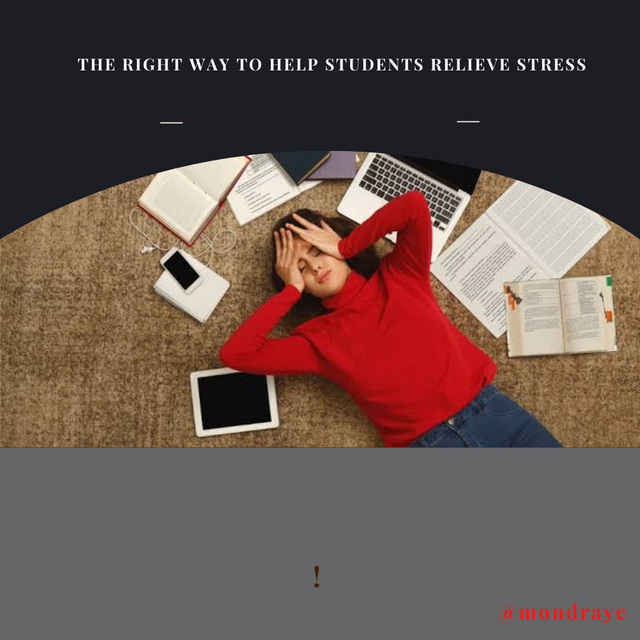THE RIGHT WAY TO HELP STUDENTS RELIEVE STRESS
Greetings,
It's your friend @mondraye.
I recently served as the moderator of a panel that was intended to offer guidance to secondary school students before they leave for university. The majority of the panelists' advice basically just said, "Don't worry."
"Don't worry about choosing your course. Even engineers work in banks"
"Don't worry about graduating with your set. Go at your own pace."
"Don't worry about the university to apply for. Where you graduate from doesn't matter."
I recognize the motivation behind that advice; "don't worry" is simply a well-intended effort to reduce students' anxiety. Young people are anxious about what they'll need to do to succeed in life. The issue is that most kids have learned to prioritize accomplishment since they were young. They have been prepared to view their education as a contest thanks to their high test scores, 4.0 GPA, AP programs, and fast "math lanes."
However, when pupils are abruptly told, "Oh, don't worry. It truly doesn't matter. You can move at your own pace," they say, sensing a miscommunication.
They become much more anxious because they are perplexed. In fact, after the panel, practically every student approached me and expressed their increased stress. They weren't reassured or given credit for their worries regarding college.
Students are aware that college is exorbitantly expensive and that graduating without a job that will allow them cater for their needs is unlikely. They have every right to be concerned, which is why they are.

Young individuals are more perceptive than is sometimes acknowledged. They are aware of the significant debt that many college students incur. They are informed that the reputation of particular colleges may have a favorable or negative impact on their prospects of landing a job.
Parents and advisors ought to discuss those concerns openly rather than brush them off.
Start by inquiring as to the cause of your concern over this choice. and allow them a chance to explain. I feel that if I pick the incorrect course, I'm going to be screwed for the rest of my life," they could say. What if I enroll in the more pricey private school but am unable to meet up with the school fees.
Advisors have the chance to clarify any misunderstandings and assist students in developing a stronger framework for decision-making by paying attention to their worries. Perhaps the student is underestimating the gravity of some of their concerns. Perhaps they are unaware that, no matter where they attend school, there are methods for finding employment after graduation.
You can start addressing someone's concerns once you've investigated and comprehended their concerns.
- Understand their concerns
It's important for students to understand that their concerns regarding the price or timeline of a college education are real and they are not crazy. The only way to assist them is to sit down with them and go over their alternatives.
Discussing the price of education with students is a good idea. The typical time to graduate and the amount of time they wish to set aside for college should be discussed with them. Prior to, during, and after college, you need to get students to consider their finances. Helping them decide between a prestigious private school and a public school may be one way to do that.
Parents may give their children the chance to release that bottled-up tension by listening to their fears and then encouraging them to explore the subtleties of those concerns. The possibilities for each scenario should be written down, and the discussion should be calm and judgment-free.
- Help them to identify the support they need
Students are already squirming due to these concerns, and their anxiety and stress are reflected in their desire to act. You're practically tying their arms down if you say, "Don't worry."
However, you may obtain help and find answers if you are aware of the precise causes of kids' anxiety.
There are individuals and institutions that can respond to queries and assist pupils in taking charge of the procedure, including dependable teachers, loved ones, friends, community resources, and school resources. Students will feel empowered to act and assume responsibility for their college experience if they can channel that anxious energy in a constructive, positive way.
Today's students are as anxious about these important decisions as they are delighted about them. However, advising them not to worry about it is unrealistic and neither useful. Regardless of what we say to them, they will still worry about it. So why not give them a channel to constructively communicate those worries before locating the assistance they require?
You need to comprehend their world and have empathy for them in order to make it happen. Give them the resources they require to make the best decisions possible, pay attention to their problems, and listen to them.
Students are often stressed out due to too many valid worries and it is often common to tell them not to worry. But the real truth is that telling them not to worry doesn't actually make them to stop worrying but it rather gives them the mind that you do not understand their feelings.
It's always best to first let students know you understand how they feel before rendering valid solutions to their problems.
10% to @campusconnectng

Hello @mondraye, thanks for publishing this post in Campus Connect community,
Your post has been supported using Campus Connect Curation account.
Keep publishing original and quality posts in Campus Connect community.